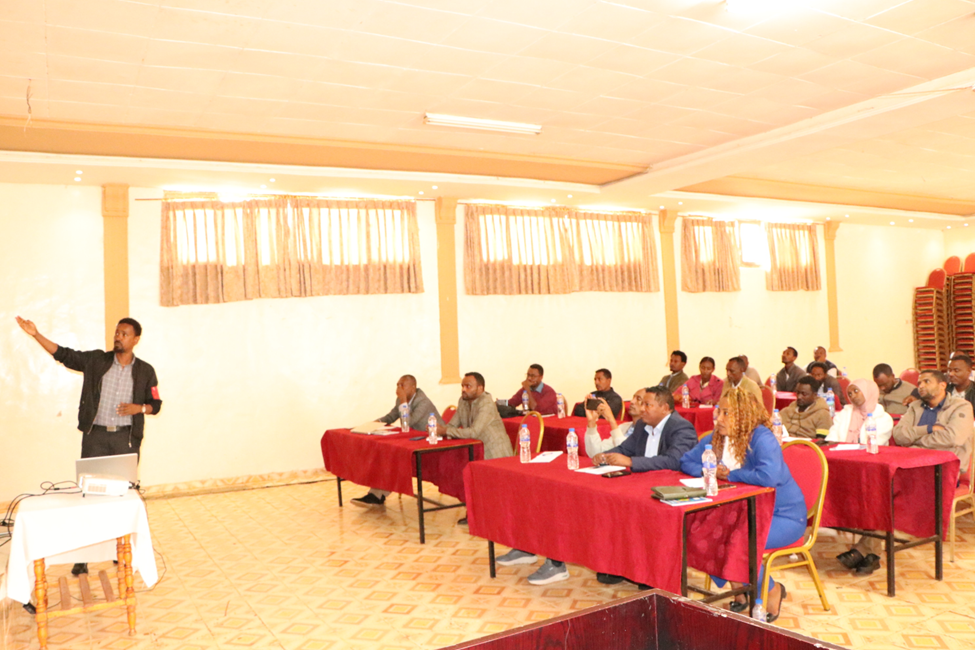A meeting was held to review the performance of the project, “Enhancing the Sexual and Reproductive Health and Livelihood Prospects of Young People.” During the meeting, the participants discussed the worthwhile outcomes achieved so far and acknowledged the potential impact of the project. They also identified areas for improvement and brainstormed strategies to overcome any challenges that may arise. The participants expressed their confidence in the project’s ability to make a meaningful difference in the lives of young people and agreed to continue monitoring its progress closely. The meeting held in Jimma City was mainly focused on reviewing the effectiveness of the strategies implemented and identifying areas for improvement. The team members expressed their satisfaction with the progress made, particularly in terms of increased awareness and access to sexual and reproductive health services among young people.
“Enhancing the Sexual and Reproductive Health and Livelihood Prospects of Young People” project was seen as a crucial step towards addressing the pressing needs of the youth in the area. The project aimed to empower young people in the Bunno Bedelle Zone by providing comprehensive sexual and reproductive health information and services through referrals to youth-friendly corners, as well as skills training and economic opportunities. By equipping young people with knowledge and resources, the project aimed to reduce the prevalence of sexually transmitted infections and unintended pregnancies, ultimately improving their overall well-being. Stakeholders recognised that by investing in the youth’s well-being and future prospects, the project had the potential to contribute to the overall development of the entire community. With its comprehensive approach, the project aimed to empower young individuals by providing them with essential knowledge and skills, ultimately leading to improved health outcomes and increased economic opportunities.
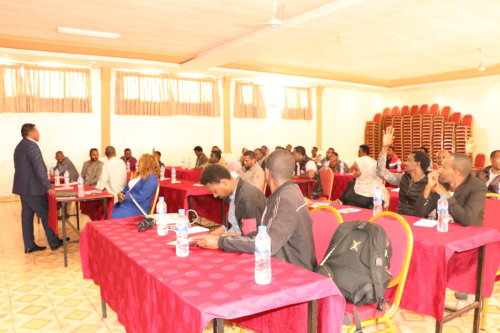
DSW Ethiopia Country Director, Mr. Feyera Assefa meeting participants
The performance of the projectwas discussed at the meeting. The meeting’s participants acknowledged the project’s potential impact while discussing the worthwhile results so far. Additionally, they pinpointed areas that needed improvement and came up with solutions for potential problems. The participants agreed to continue paying close attention on the lifecycle because they believed it had the potential to significantly improve the lives of adolescents and young people. Reviewing the effectiveness of the strategies put in place and identifying areas for improvement were the main objectives of the meeting held in Jimma City. The team members were pleased with the advancements made, particularly the increased awareness and access to sexual and reproductive health services among young people. They also acknowledged the positive impact of the project on promoting gender equality and empowering young girls to make informed decisions about their futures.
In his opening statement, Mr. Segni from the Ethiopian Ministry of Health expressed his appreciation for the efforts made by the SAfA in addressing the pressing issues of sexual and reproductive health among young people. He emphasised the importance of collaboration between the SAfA and other stakeholders to ensure the project’s success.
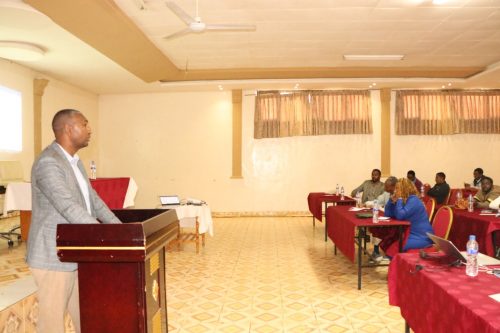
Mr. Segni from the Ministry of Health
Mr. Segni also highlighted the need for sustainable strategies that go beyond the duration of the project to create lasting change in the community. Mr. Segni said working on sustainable strategies is crucial to ensuring that the positive impact of the project continues even after its completion. He stressed the importance of engaging with local communities and building their capacity to sustain and replicate the project’s initiatives in the long run. Additionally, Mr. Segni mentioned the significance of monitoring and evaluation to track progress and identify areas for improvement, ensuring that the project’s outcomes are effectively measured and lessons learned can be applied to future endeavours.
Monitoring feedback was presented at the meeting by Mr. Birhanu from the Oromia Region Bureau of Finance and Economic Development. Mr. Birhanu highlighted the positive outcomes achieved through the implementation of SAfA in the Bunno Bedelle Zone. He emphasized how the project has successfully improved access to sexual and reproductive health services for young people, leading to better livelihood prospects and overall well-being in the community. In addition, Mr. Birhanu also shared that the SAfA project has played a significant role in reducing teenage pregnancies and sexually transmitted infections among young people in the area. The increased awareness and availability of reproductive health services have empowered young individuals to make informed decisions about their sexual and reproductive health, contributing to their overall development and future opportunities.
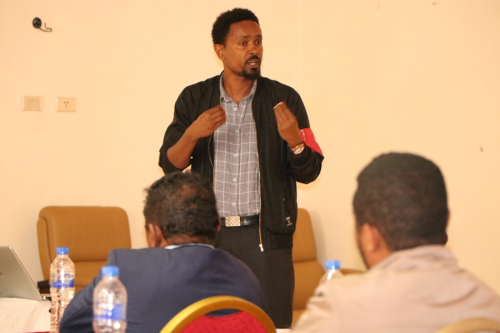
Mr. Birhanu from the Oromia Regional Bureau of Finanace and Economic Development
Furthermore, Mr. Birhanu discussed the importance of sustaining and expanding such initiatives to ensure continued progress in addressing the needs of young individuals in the region. He emphasised the need for comprehensive sexual and reproductive health programs in schools to further promote healthy behaviours and prevent the spread of sexually transmitted infections. Mr. Birhanu also highlighted the significance of providing accurate and age-appropriate information about contraception and family planning methods, enabling young people to make informed choices about their reproductive health. Additionally, he stressed the importance of involving parents, communities, and other stakeholders in these programs to create a supportive environment that fosters open dialogue and reduces stigma surrounding sexual and reproductive health. Mr. Birhanu acknowledged SAfA’s potential impact in the Bunno Bedelle Zone by stating that the organisation’s efforts have the potential to greatly improve the overall well-being and empowerment of young people in the community. He emphasized the need for continued collaboration with local schools, healthcare providers, and government agencies to ensure the sustainability and scalability of SAfA’s initiatives in the Bunno Bedelle Zone.
Representatives from the Oromia region Health Bureau, the Bunno Bedelle Zone hHealth Office, the Oromia region Bureau of Finance and Economic Development, and the Ministry of Health participated in the panel discussion.
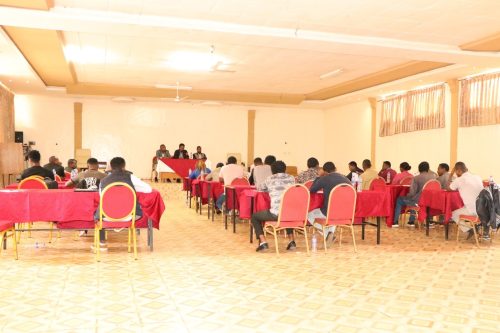
Panel discussion with participants
They also emphasised the significance of addressing the unique challenges young people face in accessing services for sexual and reproductive health and their chances for economic empowerment. They highlighted the need for comprehensive and age-appropriate education on sexual and reproductive health, as well as the importance of providing accessible and affordable healthcare services. Additionally, they stressed the importance of creating opportunities for young people to gain skills and knowledge that can enhance their economic prospects and contribute to their overall well-being. Additionally, stakeholders highlighted the need for sustainable strategies that would ensure the long-term success of the project and its positive impact on the Bunno Bedelle Zone. They also emphasized the significance of involving local communities in the decision-making process and ensuring their active participation in implementing and sustaining the project. Moreover, stakeholders emphasised the need for continuous monitoring and evaluation to measure the effectiveness of interventions and make necessary adjustments to achieve desired outcomes. All the representatives reflected on the key issues of adolescent and youth reproductive health, including access to comprehensive SRH education, the availability of contraceptives, and addressing social norms and cultural barriers that hinder young people from seeking reproductive health services. They also highlighted the importance of addressing gender inequalities and promoting gender-responsive approaches to ensure that both boys and girls have equal access to reproductive health information and services.
In his concluding remarks, Mr. Feyera Assefa, Country Director of DSW Ethiopia, expressed his gratitude to all the stakeholders for their active participation and valuable input during the meeting. He emphasised the importance of their continued support in order to maximise the positive impact of SAfA in the Bunno Bedelle Zone. Mr. Assefa highlighted the significant impact the project has already had on the young people in Bunno Bedelle Zone. He urged all stakeholders to collaborate closely and work towards sustaining these positive outcomes for the long-term benefit of the community.
Photos: private
